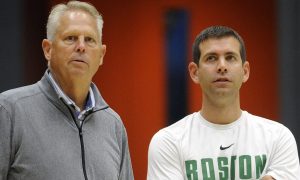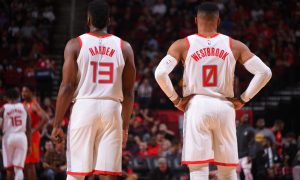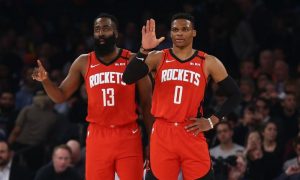Cormac McCarthy’s No Country for Old Men (and the Coen Brothers’, too) features a character named Anton Chigurh, played in the movie by Javier Bardem, who in reviews and analysis is often referred to as “the personification of evil.” While possibly true, this description misses a defining point: Chigurh represents an evolutionary leap, a meaningful step beyond what has traditionally been understood as evil, to the point that for the story’s protagonist, Sheriff Ed Tom Bell, the situation has progressed beyond recognition. Hence the title: these leaps give us the feeling of barreling toward something unfamiliar, to the point that a single life is too long to fully and properly comprehend this country.
The Philadelphia 76ers are of course not evil (unless you’re a season ticket holder). Sports don’t bear that kind of moral weight. But in terms of evolutionary significance the 2013-14 Philadelphia 76ers are something like the NBA’s very own Anton Chigurh: we’ve experienced a manipulation of the rules and questionable effort on all levels of NBA competition in the past, but never before have we seen an organization so egregiously and unashamedly pursue failure for strategic purposes. For well-meaning sports fans, this situation has progressed beyond recognition.
Unlike previous efforts at tanking, the 76ers are in no way trying to disguise their con. When late-season lottery-bound teams apply phantom injuries to their players for less-than-honest reasons it induces eye rolls, and as recently as 2012 yielded full-blown outrage. And here we have the Philadelphia 76ers adopting a strategy of outright, deliberate failure, starting before the season’s opening tip.
Look at the way the franchise handled its coaching search. After ending the Doug Collins era that had characterized the first two years of Joshua Harris’ ownership, the 76ers opted to disregard the pace of 12 other teams with head-coaching vacancies, waiting until mid-August to officially bring Brett Brown on board. The next-latest hire, new Boston Celtics coach Brad Stevens, was signed six weeks earlier. The first hire of the season, Mike Brown of the Cleveland Cavaliers, occurred almost three months prior to Philadelphia finally pulling the trigger. This wasn’t a record-setting delay by any means: David Kahn held out until the end of September to secure Rick Adelman for the Minnesota Timberwolves back in 2011. But no team likes a Kahn comparison, and a 118-day coaching vacancy is unquestionably an outlier.
And yet the prolonged coaching search pales in comparison to Philadelphia’s roster evolution this summer. Carrying two starters, four rotation players, and a single reserve from the previous year’s roster into the 2013 free agency period, and having traded their sole All-Star for zero usable pieces in 2013-14, the 76ers opted to … do nothing. The team acquired a couple of deep prospects from the Houston Rockets, one was cut before the season began and another currently playing in Istanbul. They claimed two players off waivers, and one even made the opening night roster. And that was it. July came and went.
NBA rules require a minimum of 12 active players on a team’s roster and a payroll of roughly $53 million this season. More than 50 days into the free agency period and the 76ers were carrying nine players and $43 million of salary. Philadelphia pried guard prospect Tony Wroten away from the Memphis Grizzlies at the end of August, propelling them closer to a legal roster. And yet any reasonable mind wound still wonder why, when shy of the minimum in both players and payroll, the 76ers wouldn’t attempt to bring an affordable contributor to Philadelphia. Even with a promising draft class looming, this is unlike anything the NBA has seen before. It’s incomprehensible.
Given the landscape of the NBA this offseason, the 76ers are understood by some to be a success story, fielding the worst possible team at a time when lottery odds are perceived to be second in value only to championship rings. After all, the consequences of falling short of the minimum salary threshold are minor, and this strategy is now cynically viewed as a savvy one. The question of the meaning and effectiveness of tanking has been well addressed by NBA writers these last several months, and no real consensus has emerged. But there’s no doubt that a sense of sportsmanship and commitment to winning has lost its importance, and while many teams have adopted similar approaches, only the 76ers represent a meaningful step beyond what has traditionally been understood as strategic manipulation. This isn’t careful rebuilding following a natural degeneration; it’s methodical destruction.
Where can this be coming from? The mastermind behind this summer’s stunning progression is Sam Hinkie, an executive from the Houston Rockets hired to right Philadelphia’s ship. Hinkie is one of several progressive minds now leading NBA franchises that focus on advanced statistical measures, new technology, and the supposed long game. And yet this strategy in no way resembles that of Hinkie’s intellectual forefather, Daryl Morey of the Rockets, who consistently fielded competitive rosters while assembling his contender. It’s hard to imagine Morey’s current masterpiece coalescing after the kind of self-imposed futility the 76ers have adopted.
One wonders whether this all jives with the worldview of Joshua Harris, owner of both the 76ers and the New Jersey Devils and co-founder of Apollo Global Management, a massive private equity firm. Apollo was forged from the remains of another firm called Drexel Burnham Lambert, at one time one of the most successful brokerages in the country that in 1990 was forced into bankruptcy for its involvement in illegal activities. Following this calamity, several of the company’s executives, including Harris, formed Apollo.
Apollo’s specialization is in something called leveraged buyouts, made temporarily famous in 2012 due to the previous participation of Mitt Romney and Bain Capital. The deal with leveraged buyouts, simply put, is to borrow huge sums of money to take over distressed companies and then to extract as much value from that company as possible while leaving the company itself on the hook for the borrowed money that enabled the purchase in the first place. In no way is the goal to make the company profitable, or to secure the salaries of the employees, but rather to bleed the company dry by firing workers and eliminating benefits and then selling the remaining corpse at a huge gain. You may remember it as Gordon Gekko’s scheme in Wall Street.
Regardless of your politics or worldview, it’s hard to see the work of Apollo as anything other than a cutthroat existence that shows no mercy to anyone and wields power pitilessly. If this is the world from which Harris came, does it stand to reason that he’d manage his franchise in a similar fashion? The 76ers do not seem particularly concerned with their fans or the morale of their players. Are the 76ers operating in such a strict bottom-line world that these factors somehow no longer matter? What the hell is happening here? It’s awful to consider. To paraphrase Sheriff Ed Tom Bell, no one wants to go out and meet something they don’t understand. A man would have to put his soul at hazard.
The Chigurh analogy implies an element of resignation, because a trait can only be evolutionary if it is well fitted for the functional roles it performs, and so the implication would be that Philadelphia’s ploy will work. Chigurh’s evil made him more dangerous, and so it represented a trait that is more likely to survive. The strong preference for most NBA fans would be for Philadelphia’s revolutionary method to be a historical outlier and not the new norm, or put differently, a mutation rather than adaptation. This is only possible if the strategy ultimately fails; success will yield imitators. The mess can be handled relatively swiftly with an NBA rule change, or it otherwise may take several years to be fleshed out with any certainty.
But there’s in fact a third possible outcome, one that in the early days of the season is most surprisingly rearing its head: the Philadelphia 76ers could, in spite of management’s worst intentions, just win. And this is precisely what they’ve done. They stunned the defending champion Miami Heat in their home opener, conquered playoff hopeful Washington Wizards on the road, and jumped to 3-0 with an unlikely victory over expected contender Chicago Bulls. While three games is no reliable sample size, Philadelphia’s three early wins already represent roughly 20 percent of the victories anyone expected of them this year, and we’re now just one week into the season.
In the end, Chigurh’s evolutionary trait is put into context via pure chance, in his case an automobile accident. Philadelphia’s management got their own bit of context when their ersatz roster started the season by ripping off three wins. It’s not enough to definitively settle the adaptation/mutation question, but it’s certainly casting some doubt. One can hope it’s natural selection at work.



















